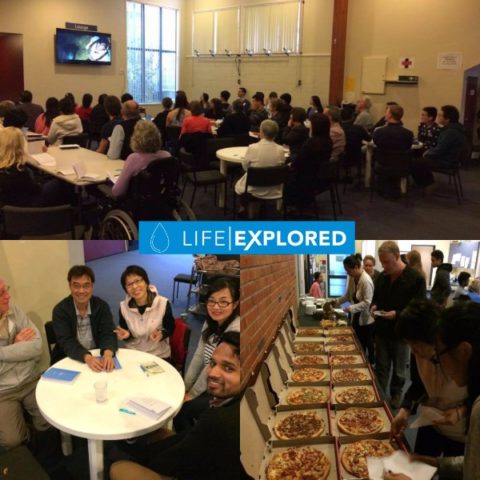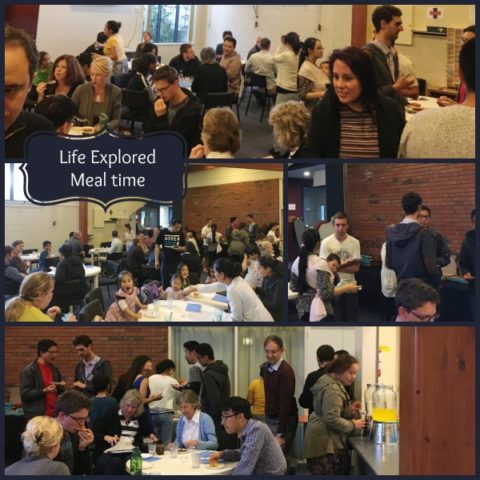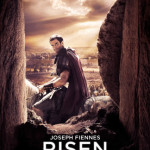Summary: Life Explored by CE Ministries is ambitious, compelling, well-produced and divisive. It accurately presents the Bible’s grand narrative of humanity’s age-old longing for happiness, found most fully in the unsearchable riches of God Himself in Jesus Christ. The combination of engaging preaching, high-quality film-making, and discussion-based relationships combine to effectively transform the hearts of 21st-century men and women, Christian and non-Christian, who are able to grasp the idea of their sin ultimately as the worship of other gods before God Himself.
This is a long review! The summary / TLDR version is above. The full review is below.
Update 13/3/17: Barry Cooper has kindly written a “cheat sheet” to help kick off the discussion following Film 1 – https://barrycooper.com/2017/03/07/life-explored-cheat-sheet/
Communicating the gospel in a “post-truth” world
Earlier this year, a friend of ours did a round-the-world trip that included some of the ancient sites of early Christianity. He shared how while they were in Athens, Greece, they got to sit at the top of Mars Hill and read the Apostle Paul’s famous sermon recorded in Acts 17:
“People of Athens! I see that in every way you are very religious. For as I walked around and looked carefully at your objects of worship, I even found an altar with this inscription: to an unknown god. So you are ignorant of the very thing you worship–and this is what I am going to proclaim to you.
“The God who made the world and everything in it is the Lord of heaven and earth and does not live in temples built by human hands. And he is not served by human hands, as if he needed anything. Rather, he himself gives everyone life and breath and everything else. From one man he made all the nations, that they should inhabit the whole earth; and he marked out their appointed times in history and the boundaries of their lands. God did this so that they would seek him and perhaps reach out for him and find him, though he is not far from any one of us. ‘For in him we live and move and have our being.’ As some of your own poets have said, ‘We are his offspring.’
“Therefore since we are God’s offspring, we should not think that the divine being is like gold or silver or stone–an image made by human design and skill. In the past God overlooked such ignorance, but now he commands all people everywhere to repent. For he has set a day when he will judge the world with justice by the man he has appointed. He has given proof of this to everyone by raising him from the dead.”
(Acts 17:22-31, NIV)
As noted by many scholars and bible teachers, Paul’s sermon here is a master class in communicating the saving message of the risen Lord Jesus to an audience without any knowledge of the Christian faith. Tim Keller points out:
“When Paul addresses the Areopagus, a body of the elite philosophers and aristocrats of Athens, he was, quite literally, speaking to the cultural elites.”
Now – imagine you were a Christian, travelling with Paul (as Barnabas, Silas, or Tychicus did). Picture yourself at Mars Hill, listening to Paul preach his heart out among the who’s who of philosophers (perhaps the equivalent of the combined forces of every world-famous Ivy League / Oxbridge academic).
I wonder if you would have been critical of Paul’s sermon. Was it Christian enough? What kind of sermon skips mentioning the name of Jesus? Why no mention of the Ten Commandments? What about the cross? What a terrible way of preaching the gospel!
Of course, we know from Paul’s other sermons and letters that he’s very capable of proclaiming the gospel of Christ using “Christianese” (try read Romans with a non-Christian friend and you’ll know what I mean!). Yet in Athens, confronted day by day with people who behave religiously but don’t know it, and with no exposure to the God of the Bible, Paul deliberately chooses to present the gospel in a way that resonates with them – quoting their own poets, revealing their own worship, and introducing the God of the Bible and his appointed Man, who displays His authority over all people everywhere by his resurrection.

Life Explored: CE Ministries’ attempt at the Mars Hill method
Enter Life Explored (LE) – a new resource developed by the makers of Christianity Explored, that tries to present the gospel with this same approach in mind. Their website sums up the course content well:
LE is a seven session series featuring a combination of short films – shot around the world – and Bible interaction… [it] is an exposé of the little gods that promise us so much happiness, yet deliver so little. As it explores the Bible story (creation, fall, redemption, new creation), Life Explored shows how our deepest desires for happiness can only be satisfied in one person, Jesus Christ. The best gift God can give us is himself.
Over the years I’ve used and benefited from all kinds of tools and methods to support my faltering efforts at sharing the gospel with others – the Way of the Master, Four Spiritual Laws, Knowing God Personally, Two Ways to Live, Perspective Cards, Christianity Explored, the Romans Road, group bible studies, informal conversations to name a few. I’ve had the awesome privilege of seeing God save people with some of these approaches, and see strengths and weaknesses in each approach as they try to make evangelism easier for Christians.
So it’s exciting to have the opportunity to carefully consider LE – especially since it seems to be the first evangelistic tool specifically designed to try and reach our generation of post-truth millenials, most of whom have absolutely no Judeo-Christian heritage or background. Here are the four distinctives of LE:
- Increasingly, people have no understanding of biblical literacy. There’s no context to know who Jesus is and why he came. So in seven sessions, LE gives a bird’s eye view of the whole Bible story – creation, fall, redemption, new creation. Unlike Christianity Explored (which focuses on Mark’s Gospel) or other courses, LE tries to present the grand sweep of the bible – in seven weeks you cover creation (Gen 1), the fall (Gen 3), Abraham’s promise (Gen 12), the Exodus (Ex 3-12), Jesus and the Samaritan woman (John 4), the Gospel (1 Cor 15) and finally the new creation (Rev 21-22).
- More and more people today reject a caricature of God, rather than the One actually presented throughout the Bible. So in each session, LE presents a different aspect of God’s character – in seven weeks you learn that God is good, trustworthy, generous, liberating, fulfilling, life-giving and joyful.
- In a postmodern age where more and more people today don’t understand the concept of law-breaking. Or if they do, there is less agreement with sin as rule-breaking (“Stealing’s not wrong, depending on the context.” “As long as it makes you happy, it doesn’t matter who you sleep with.”) So throughout the course, LE explains sin as idolatry – looking to something other than God for their ultimate security, contentment and acceptance. That way no one is off the hook, because all of us have broken the First Commandment – we’ve replaced God with something else, exchanged the truth about Him for a lie.
- Humans have always loved to tell and listen to engaging stories, and sometimes these narratives connect in ways that stating propositional truths can’t. To tap into this, LE includes a series of short films to help people grasp biblical truth in a deeper, more convicting way.
You can read more about the course here. For those familiar with Christianity Explored (CE), the main difference between the two is that LE seems to start further back than CE, is more thematic, it doesn’t require any homework, and you go through the whole bible story, and not just one book of the Bible.
It all sounds ambitious, right? I thought so too. Yet LE certainly came with heavyweight endorsements when it was released worldwide on 1 September this year. For example, New Testament scholar DA Carson’s commendation reads:
“At a time in the Western world when basic knowledge of the Bible is increasingly rare, it is a pleasure to recommend Life Explored. Here is an introduction to the good news found in Jesus Christ, sweeping through some of the “big pictures” in the Bible. As far as a short series can, Life Explored outlines what the Bible is about, exposes our idolatry, and makes clear where forgiveness and hope lie. This is one of the best of the rising number of evangelistic tools addressing men and women in the twenty-first century.”
What could be better than that, right?

LE @ Howick Baptist: our church’s experience
When our Senior Pastor saw the trailer and the promo material, he was immediately excited by the possibility of using LE as a tool to help our church engage more people with the gospel. Our elders and staff team also warmed to the idea of using this tool to evangelise our community, and also to encourage our church to band together and serve together.
So from October to November 2016, my home church (Howick Baptist) had the unique privilege of being the first in NZ to run LE as an event-based, evangelistic outreach. We showed the promo materials and did some upfront interviews about LE a month beforehand, and gave every church member an invitation card with the details of our church’s course on it. We tapped about a dozen members to lead the discussion and bible studies at tables and others to coordinate a shared meal and childcare for each session. We used our church website and social media to advertise the course and encourage church members to invite their family, friends and co-workers along.
So what was our experience as trailblazers for LE?
Encouraging. We managed to have 55 people show up the first session, with numbers hovering between 40 to 50 right through to Session 7 (for us, this was double the number of people who attended a similar outreach using CE the previous year).
Engaging. Everyone who came heard the good news of Jesus clearly and passionately presented, from Genesis to Revelation. Several guests who didn’t consider themselves Christians came along, invited by church members. We started at 5:30pm and ended at 7pm with dinner (provided by the church) – but many people (especially guests) stayed on past 8pm chatting and enjoying the company.
Effective. Since the course ended, two of these guests came along to our Sunday morning church service (and one plans to come next week). One decided to follow Jesus Christ, while a few others have come away genuinely wrestling with the gods they love, and considering the cost of turning away from their idols and trusting in Jesus. Also, those of us who served together during LE had great times of prayer, fellowship and encouragement, and we drew closer together as a church family and in our personal relationships.

Here’s what we found excellent about running LE:
- The Bible content was fantastic. Each session included a 10-15 minute sermon from either Rico Tice (the favourite presenter for some), Barry Cooper and Nate Morgan Locke. Every phrase seemed carefully crafted to lay the foundations of a survey through the whole Bible, and showed how different threads and storylines tie together in the person and work of Jesus Christ. The final bible talk on Revelation 21 was stunning – tying up all the threads of the previous videos and stirring a longing to see the face of Jesus Christ and accept the invitation to His wedding feast. Another positive was that each video was accompanied by a short bible study on a different passage to the video sermon – these were very well-received. So over the 7 weeks we also studied Psalm 19, Romans 1:18-25, Luke 19:1-10 (Zacchaeus), Matthew 11:27-30 (Rest), Luke 15:14-32 (The Prodigal God), Acts 17:22-31 (Paul in Athens) and Matthew 22:2-14 (the Parable of the Wedding Feast).
- Jesus was presented not only as factual, but also as beautiful. Yes, the important facets of the gospel is communicated – salvation by grace through faith does come through, as well as substitutionary atonement (especially in Week 4 and 6 when discussing the Passover and the cross). But what LE did really well was identify with our longing for happiness, for fulfillment, freedom, life, rest and so on, and then present God in Christ as the most compelling solution for all these longings. Unlike other gospel presentations, Christ was presented as more than a band-aid or bridge, but as the centrepiece of all our hopes and dreams. Here’s an example from Nate in Week 3:“So, who is this offspring of Abraham, through whom God would bless all nations? Who’s the descendant who would solve the world’s problems? It’s Jesus Christ. He is the promise come true. He’s the one who said to all those who are exhausted by the demands of their gods… he says, “Come to me, all you who are weary and [heavy laden], and I will give you rest” (Matthew 11:28). He’s the one who says to those who are sick and tired of being minions, “[I’ve] not come to be served, but to serve.” (Mark 10:45). He’s the one who washed his disciples’ feet. He’s the one who gave his life for people of all nations. He’s the one of whom it was said, “The wages of sin is death, but the gift of God is eternal life in Christ Jesus our Lord.” (Romans 6:23) He is the Generous God.“
- It was accessible to non-Christians. Everything was worded carefully to give support to our guests with no prior background to Christianity. Those guests engaged really positively with the films, with the discussions, and it was very easy to follow up into personal 1-to-1 conversations about the gospel. The handbooks had good explanatory notes and they didn’t need any prior experience with the bible to study it.
- As leaders, we were challenged to be honest and transparent ourselves. Time and time again I’d chat with fellow table leaders and share how because we were convicted of own idols during the week preparing for the study, we were then able to lead our discussion tables with openness and authenticity. Where it’s easier for a course like CE for leaders to be the “experts” and guests the “novice”, LE’s content convicted both leader and guest, and levelled the playing field. All of us were challenged to see how we need to repent and trust Christ, instead of all the other good things we find our security and comfort in.
- The videography was top-notch. The short films / parables were excellent aesthetically, and would have fit in seamlessly at a contemporary film festival. People appreciated the quality and slickness of each video. One leader remarked: “It’s good that the films were so well-made… often Christian videos aren’t very good quality.”

Here are a few things we found challenging about running LE:
- The story films received a mixed response. Although the six story films / parables connected very well with millennials and other younger guests, they were confusing or frustrating for other guests, and in particular older Christians. Sure, you could dismiss the criticism and argue that the films weren’t aimed at them. But it makes it harder to get buy-in from a multi-generational church family if the older half come away dismissing it as “airy-fairy” or “a bunch of gobbledy-gook”. Some videos were clearer and more effective than others: general consensus in our group was that clearest films were Week 4 (Lawn), Week 5 (Geisha) and Week 3 (Gold); while the most obscure/confusing films were Week 2 (Hotel) and Week 7 (Space). That being said, there was always lively discussion straight after the videos (even if it was people saying they didn’t like it!).
(Update 13/3/17: Barry Cooper has kindly written a “cheat sheet” to help kick off the discussion following Film 1 – https://barrycooper.com/2017/03/07/life-explored-cheat-sheet/) - It’s more emotionally draining to lead LE. Because of how each week our idols are exposed and laid bare, for leaders it can be more draining to lead and run LE than other evangelism tools and methods. One of the strengths of evangelism tools like CE and LE is that you get to share the Word in the context of ongoing relationships. Because of the nature of the content, from Week 1 you are asking tough heart questions and trying to expose idols of the heart. That made for really awkward silences at some tables, and some exhausted people towards the end of the seven weeks. Consider that if/when you select leaders.
- The course seemed to elevate the story films above the Bible talks. Whether it was the constant cutting back to the story films during each sermon, or CE’s broader promotional and social media arm trying to sell these “six stories exploring our longing for more” as award winning, there’s this sense (whether deliberate or not) that the CE promo guys want the story films to be accepted and recognised, more than the bible content. The suggested timings in the leaders guide seemed to emphasis discussing the Film 1 set (the story/parables) more than Film 2. I think this is a shame, because what’s in Film 2 set (i.e. the bible talks) is so incredibly good. We found that leaders and guests really wanted to spend more time chatting about the bible talk. Sure, some of the stories were great discussion starters, but you don’t want them to overshadow the simple unfolding of the Bible’s One Story of redemption through Jesus.
- The “sin as idolatry” theme got tiring after awhile. Some weeks it would seem like you were discussing the same idols week after week. (e.g. “I struggle with ____ as an idol, I think God’s not generous if I don’t have it.” Next week: “I struggle with ____ as an idol, I feel like I’m not free because I don’t have it.” Next week: “I struggle with ____ as an idol, I feel like I’m not fulfilled when I don’t have it.”) One leader put it this way: “The 5 questions in the middle all hit at a very similar things (what are you worshipping). By week 6 I felt like we had exhausted the topic. It did however drive the point home.”
Out of these “negatives” (which should be read as constructive criticism!) I think the concept of the story films was the most debated among the leaders and guests. I personally found them very engaging in the main, though I agree that some of the stories were stronger than others.

Here are some practical tips for others planning to run LE (given that our context was a church-wide outreach):
- Don’t skip the meal! Most of the best evangelistic conversations happened over dinner, as people ate together at their tables and kept chatting. Our meals weren’t elaborate – most weeks we had pizzas, salads and water/juice/tea and coffee. On the final session we invited everyone to bring a plate to share and it was like celebrating the end of a journey together as a family. It was great to finish a bible study on the Parable of the Wedding Banquet and move straight into an actual feast! What a great opportunity for non-Christian guests to experience the warmth and hospitality of people united in Jesus, and for them to “catch” the idea of a gospel community in the same way as Jesus Himself did so much evangelism around meals.
- Choose leaders who “get it”. It’s quite a mind shift for people to understand and present the Bible’s understanding theme of sin as idolatry, and to grasp the idea that repentance and faith means turning away from little gods that fail us, and trusting in the God who gives up His life for us and satisfies us fully. If your leaders aren’t confident in communicating and being transparent about this in their own lives, the discussions will stay theoretical and won’t get to the heart of people’s sin.
- Split off the “Christianese” people. We had several people from church who came along to check out the course for themselves instead of bringing their non-Christian friends. It was helpful to group them into their own table so that the questions and discussion material could be better tailored to them as believers. This also means that church members who struggled to communicate without using Christian jargon were better understood by others, and didn’t confuse non-Christian guests.
- Keep guests at the same tables as much as possible. Because LE requires guests to be honest and transparent, for some guests (particularly non-Christians) a different person or leader at the table can affect the table dynamic quite significantly, and be a barrier for them to open up. Establishing rapport and relationship takes time.

Finally, since it’s such a new course, here are some of my own personal suggestions for future updates and adjustments to the material – arranged from radical to cosmetic (CE Ministries in London, this bit is for you!)
- Nix Film 1 completely – Replace the six story films with interviews of real people around the world answering the opening discussion questions (in the same vein as these social media vox-pops). For those who have real trouble connecting with the films, a vox-pop type approach might be less confusing, and actually match more closely with Paul’s approach with the Athenian intelligentsia as he debated them in the marketplace. So why not start each session with 4-5 people from different backgrounds, ages, ethnicities answering the opening question: “What’s the best gift God could give you?” “What keeps you going in difficult situations?” “What’s your ‘if only’?” Perhaps these short clips would be useful standalone content in themselves and still connect well with post-moderns/millennials. Tim Keller’s “Reason for God” DVD (where you watch a discussion with a group of six skeptics through several sessions) could be another model / starting point for this kind of content.
- Change the opening question of Session 1 (The Good God). We found the question: “What’s the best gift God could give you” was quite deep and personal for people you hadn’t established a rapport with yet (“What? You’ve just met me and you’re asking me about my deepest, darkest desires?”) For our church’s outreach, we gave table leaders the option of using the following opening questions for a gentler entry into the discussions:
- “What’s your name and what made you come along to Life Explored?”
- “If you could ask God to give you something, what would it be?”
- “Think about the god you’ve asked. What is that god like?”
- Change the opening question of Session 2 (The Trustworthy God). It’s a massive jump to move from the Hotel film – a heartbreaking story of a broken friendship in colonial India (with its complex undertones of racial injustice, unrequited love, paradise lost, etc) – to a very cerebral question: “What’s your current view of of God, and how did you reach that viewpoint?” To more clearly connect with the theme of the trustworthy God, we suggested an alternative question to our table leaders: “Have you ever been in a situation where someone let you down?”
- Give more guidance to churches and leaders presenting the course. Our experience as a staff team was that it took a lot more effort and planning to MC and lead the course – you couldn’t run LE straight “out of the box” because the Leaders Guide gave too little detail regarding how to run it in a big group. While I appreciate the idea of adapting the Leaders material to make the course more flexible for other contexts (e.g. 1-to-1 use), it would have been far more helpful if there was a script outlining an event-based session, with examples of what the MC could say and suggested timings, in the way the pre-2015 version of Christianity Explored did. It’s easier for leaders to strip those details out than to try and come up with it ourselves.
- Offer videos of female teachers presenting the 2nd film bible talks. I think there’s genuine benefit in having women present the bible talks. Perhaps make it a separate downloadable resource and charge for it. It could be really engaging for a women’s bible study going through the LE material with quality teachers like Rosaria Butterfield, Carrie Sandhom or Jenny Salt presenting, with their own illustrations and examples tailored for women.
- Change the name of Film 5 (Geisha). The character in the story is portrayed as a modern-day Hosea’s wife. But geisha aren’t prostitutes! (It’s a terrible misunderstanding that dates back from post-WW-II American GI’s giving actual prostitutes the nickname “Geesha girls”.) It seems like a minor detail, but a Japanese person would notice.
Conclusion: what’s the best gift God could give you?
So – is LE worth using as an evangelistic tool for your church? Despite some of the challenges, I think so. I agree with Jeff Higgins who said this:
“All in all, I highly recommend Life Explored as a passionate, piercing presentation of the Gospel. Life Explored gets right to the heart of the question; which God/god do we worship?”
You might have to tweak it a bit to work for your church or small group. You may need more time studying and processing the paradigm shift towards the underlying principles of sin as idolatry, biblical theology and communicating the gospel in a post-modern culture. Don’t be afraid to rewrite some of the questions. Be prepared to be convicted yourself, as you journey through LE with those you’re evangelising.
But I’m confident that, by God’s grace, you’ll come away from LE more captivated by the beauty of Jesus Christ, and more convinced that the best gift God could give you is Himself. What could be better than that?
If you’d like to find out more about LE, you can chat with Cam Gracey, the NZ Coordinator of CE Ministries, or visit The Good Book Company NZ to view the resources.





Great, thorough, helpful review thanks!
Thanks a great review, I’ve been thinking similar things over in Perth.
Love it it is great, it is a bit confusing, and a bit Bible lite, and the oldies at my church – hated videos with no talking just silent film, though they said it much more gently).
We are running it the second time and have tweaked what videos we use and have added more Bible by getting the group to read through John’s gospel (the gospel for post moderns).
Thanks so much for the constructive and detailed review William – it’s very much appreciated!
Those of your readers who are running LE might appreciate this cheat sheet. It should help to address any confusion over those first films:
https://barrycooper.com/2017/03/07/life-explored-cheat-sheet/
Blessings,
Barry Cooper
Co-author, Life Explored